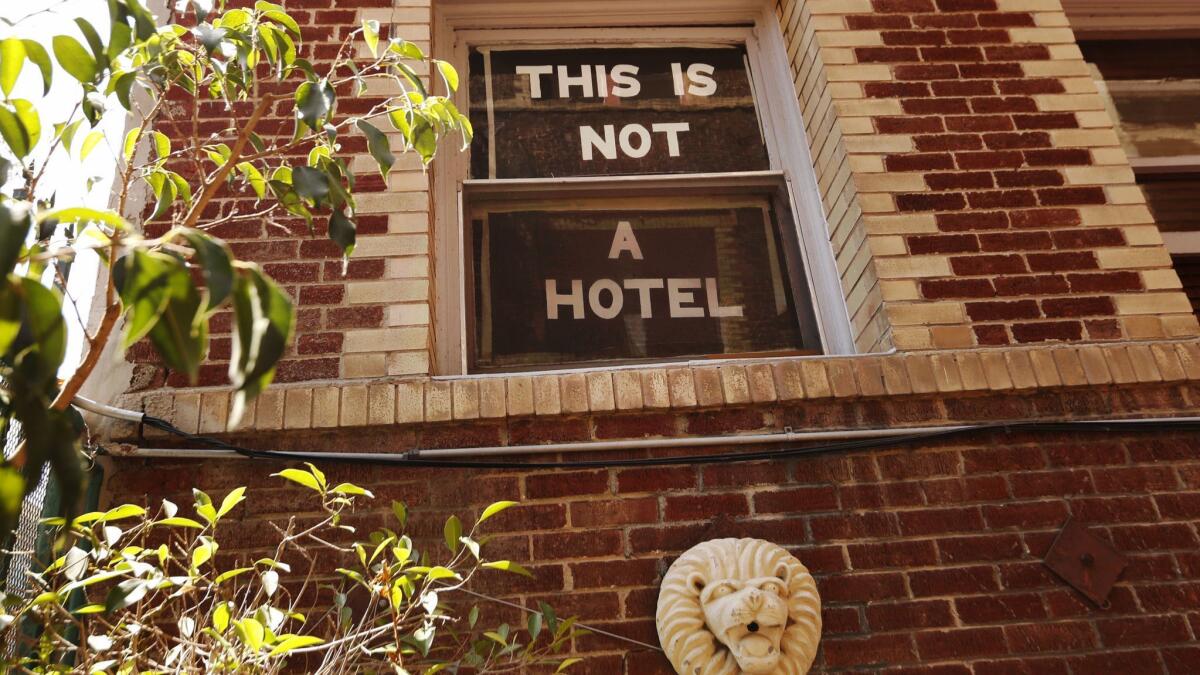L.A.’s new Airbnb rules bar short-term rentals of second homes and some apartments

New restrictions on Airbnb and similar services in Los Angeles went into effect this week, driven by complaints that an explosion of short-term rentals has turned apartment buildings into hotels and pinched the city’s already tight housing supply.
In a 2017 report, the city’s planning department said 6,000 to 10,000 units that otherwise probably would have been rented to long-term tenants were being used primarily as short-term rentals.
Vacation rental websites make it easy for property owners to rent out their own homes, offering unique lodging to tourists at rates sometimes cheaper than hotels. But after years of debate, the city in December placed restrictions on what properties can be rented and the activities of renters, and imposed obligations on hosts, who have to register and pay an $89 annual fee. The rules became effective Monday.
A $1,800 apartment became a $3,300 corporate rental. Is that bad for housing? »
What’s not allowed
The home-sharing ordinance bars any type of short-term rentals of properties other than someone’s primary residence. A primary residence is a place you live in at least six months out of the year. Bookings for all visitors are limited to 120 days a year, although there are exceptions to that rule.
When registering with the city, a host’s address on a federal or state-issued photo ID must match the address used for home-sharing. Therefore, homeowners can register only one home-sharing property with the city — those who own second homes or investment properties can rent only to long-term residents. If a host’s address on their federal or state issued ID does not match the residence used for home-sharing, they can still apply with two alternative documents proving primary residence. Examples include a valid California voter’s registration card, a pay stub issued within the last six months and a recent vehicle insurance bill.
A host who rents rooms in their primary residence can create separate listings but can rent to only one set of guests at a time, and short-term rentals of any kind are no longer allowed in rent-controlled buildings.
No longer will spaces in nonresidential buildings or temporary structures be allowed, such as an Airstream or RV parked in a driveway or a backyard storage shed.
To counter complaints of rowdy Airbnb party houses, a code of conduct was established, prohibiting amplified sound after 10 p.m. and evening outdoor gatherings of more than eight adults. Hosts must tell guests about those restrictions and could be held responsible for nuisance violations committed by guests.
As L.A. vowed to stop apartments from becoming hotels, this company made it a business »
What is allowed
In addition to registering and paying fees, hosts must keep records for city inspection and make sure smoke detectors, fire extinguishers and other safety features in rented spaces are operable.
Tenants can list their space on a short-term rental platform, but they will now need written permission from a landlord. Hosts do not have to be home when guests are there.
How it will be enforced
Once registered with the city, a host will be given a home-sharing registration number to post on all listings or advertisements.
Agnes Sibal-von Debschitz, a spokeswoman for the L.A. Department of City Planning, said the city will work with a third party to monitor listings in violation of the new rules. The platforms also will be responsible for providing information on bookings at units without registration numbers or those that have exceeded the maximum number of annual bookings, she said.
A spokesperson with Airbnb said in an emailed statement: “We will continue working with our hosts to ensure they are aware of the new process and to answer any questions about registration. We look forward to continuing to work with Los Angeles city officials on reasonable home sharing policies.”







